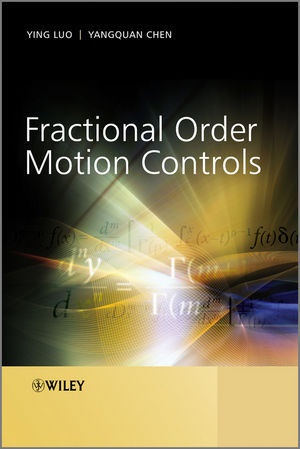Share
Fr. 186.00
Yang Chen, YangQuan Chen, Y Luo, Yin Luo, Ying Luo, Ying Chen Luo...
Fractional Order Motion Controls
English · Hardback
Shipping usually within 3 to 5 weeks
Description
Informationen zum Autor Ying Luo, South China University of Technology, China. Currently Assistant Professor in the Department of Automatic Control and Engineering, South China University of Technology, Dr Luo joined the? BS-Ph.D program? in 2004. He went to Utah State University, Logan, UT, USA, as a visiting scholar/exchange PhD?from September 2007 to February 2009 and received the PhD degree in Automation Science and Engineering from South China University of Technology, Guangzhou, China, in July 2009. Dr Luo has been based at Utah State University, Logan, UT, USA, as a postdoctoral fellow from September 2009. He has worked on several patents and has published research in some key journals. YangQuan Chen, Utah State University, USA. Dr Chen is Associate Professor in the Department of Electrical & Computer Engineering as well as Director at the Center for Self-Organizing & Intelligent Systems (CSOIS) of Utah State University, Logan. Prior to this he has held positions at Seagate Tech. Int., Singapore, National University of Singapore and Nanyang Technological University. He is the owner of 14 patents and Senior Member of the IEEE. Klappentext Covering fractional order theory, simulation and experiments, this book explains how fractional order modelling and fractional order controller design compares favourably with traditional velocity and position control systems. The authors systematically compare the two approaches using applied fractional calculus. Stability theory in fractional order controllers design is also analysed.* Presents material suitable for a variety of real-world applications, including hard disk drives, vehicular controls, robot control and micropositioners in DNA microarray analysis* Includes extensive experimental results from both lab bench level tests and industrial level, mass-production-ready implementations* Covers detailed derivations and numerical simulations for each case* Discusses feasible design specifications, ideal for practicing engineersThe book also covers key topics including: fractional order disturbance cancellation and adaptive learning control studies for external disturbances; optimization approaches for nonlinear system control and design schemes with backlash and friction. Illustrations and experimental validations are included for each of the proposed control schemes to enable readers to develop a clear understanding of the approaches covered, and move on to apply them in real-world scenarios. Zusammenfassung Covering fractional order theory, simulation and experiments, this book explains how fractional order modelling and fractional order controller design compares favourably with traditional velocity and position control systems. The authors systematically compare the two approaches using applied fractional calculus. Inhaltsverzeichnis Acronyms xix Foreword xxiii Preface xxv Acknowledgments xxix PART I FUNDAMENTALS OF FRACTIONAL CONTROLS 1 Introduction 3 1.1 Fractional Calculus 3 1.2 Fractional Order Controls 9 1.3 Fractional Order Motion Controls 20 1.4 Contributions 22 1.5 Organization 22 PART II FRACTIONAL ORDER VELOCITY SERVO 2 Fractional Order PI Controller Designs for Velocity Servo Systems 25 2.1 Introduction 25 2.2 FOPTD Systems and Three Controllers Considered 27 2.3 Design Specifications 27 2.4 Fractional Order PI and [PI] Controller Designs 28 2.5 Simulation 38 2.6 Chapter Summary 39 3 Tuning Fractional Order PI Controllers for Fractional Order Velocity Systems with Experimental Validation 41 3.1 Introduction 41 3.2 Three Controllers to Be Designed and Tuning Specifications 42 3.3 Tuning Three Controllers for FOVS 42 3.4 Illustrative Examples and Design Procedure Summaries 43 3.5 Simulation Illustration 45 3.6 Experimental Valid...
List of contents
PART I FUNDAMENTALS OF FRACTIONAL CONTROLS
1 Introduction 3
PART II FRACTIONAL ORDER VELOCITY SERVO
2 Fractional Order PI Controller Designs for Velocity Servo Systems 25
3 Tuning Fractional Order PI Controllers for Fractional Order Velocity
Systems with Experimental Validation 41
4 Relay Feedback Tuning of Robust PID Controllers 59
5 Auto-Tuning of Fractional Order Controllers with Iso-Damping 73
PART III FRACTIONAL ORDER POSITION SERVO
6 Fractional Order PD Controller Tuning for Position Systems 91
7 Fractional Order [PD] Controller Synthesis for Position Servo
Systems 105
8 Time-Constant Robust Analysis and Design of Fractional Order
[PD] Controller 123
9 Experimental Study of Fractional Order PD Controller Synthesis for Fractional Order Position Servo Systems 139
10 Fractional Order [PD] Controller Design and Comparison for Fractional Order Position Servo Systems 155
PART IV STABILITY AND FEASIBILITY FOR FOPID DESIGN
11 Stability and Design Feasibility of Robust PID Controllers for FOPTD Systems 165
12 Stability and Design Feasibility of Robust FOPI Controllers for FOPTD Systems 187
PART V FRACTIONAL ORDER DISTURBANCE COMPENSATORS
13 Fractional Order Disturbance Observer 211
14 Fractional Order Adaptive Feed-forward Cancellation 223
15 Fractional Order Robust Control for Cogging Effect 243
16 Fractional Order Periodic Adaptive Learning Compensation 275
PART VI EFFECTS OF FRACTIONAL ORDER CONTROLS ON NONLINEARITIES
17 Fractional Order PID Control of A DC-Motor with Elastic Shaft 293
18 Fractional Order Ultra Low-Speed Position Servo 313
19 Optimized Fractional Order Conditional Integrator 329
PART VII FRACTIONAL ORDER CONTROL APPLICATIONS
20 Lateral Directional Fractional Order Control of A Small Fixed-Wing UAV 345
21 Fractional Order PD Controller Synthesis and Implementation for HDD Servo System 369
Product details
| Authors | Yang Chen, YangQuan Chen, Y Luo, Yin Luo, Ying Luo, Ying Chen Luo, Ying/ Chen Luo, LUO YING CHEN YANGQUAN |
| Publisher | Wiley, John and Sons Ltd |
| Languages | English |
| Product format | Hardback |
| Released | 25.12.2012 |
| EAN | 9781119944553 |
| ISBN | 978-1-119-94455-3 |
| No. of pages | 424 |
| Subjects |
Natural sciences, medicine, IT, technology
> Physics, astronomy
> Mechanics, acoustics
Maschinenbau, Regelungstechnik, Mechanical Engineering, Solid Mechanics, Electrical & Electronics Engineering, Elektrotechnik u. Elektronik, Festkörpermechanik, Maschinenbau - Entwurf, Mechanical Engineering - Design, Control Systems Technology |
Customer reviews
No reviews have been written for this item yet. Write the first review and be helpful to other users when they decide on a purchase.
Write a review
Thumbs up or thumbs down? Write your own review.

